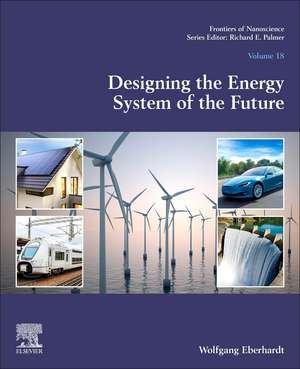Designing the Energy System of the Future: Frontiers of Nanoscience, cartea 18
Autor Wolfgang Eberhardten Limba Engleză Paperback – aug 2021
- Outlines how the population growth, industrialization and increase in standard of living have put the world on an unsustainable, dangerous path towards increasing climate change.
- Explores how existing technologies can be used to generate electricity without producing CO2 and to accommodate the energy needs for industry and commerce as well as living in health and comfort for an increasing population.
- Describes a pathway for creating a global, sustainable, and efficient energy system that enables economic growth, a comfortable standard of living and improved health, while eliminating the dangers of climate change.
Din seria Frontiers of Nanoscience
- 9%
 Preț: 792.39 lei
Preț: 792.39 lei - 23%
 Preț: 800.24 lei
Preț: 800.24 lei - 23%
 Preț: 876.81 lei
Preț: 876.81 lei - 24%
 Preț: 871.47 lei
Preț: 871.47 lei - 9%
 Preț: 900.69 lei
Preț: 900.69 lei - 29%
 Preț: 987.03 lei
Preț: 987.03 lei - 29%
 Preț: 988.33 lei
Preț: 988.33 lei - 39%
 Preț: 872.24 lei
Preț: 872.24 lei - 23%
 Preț: 994.10 lei
Preț: 994.10 lei - 24%
 Preț: 987.98 lei
Preț: 987.98 lei - 24%
 Preț: 987.90 lei
Preț: 987.90 lei - 24%
 Preț: 850.26 lei
Preț: 850.26 lei - 9%
 Preț: 787.73 lei
Preț: 787.73 lei - 9%
 Preț: 700.26 lei
Preț: 700.26 lei - 9%
 Preț: 787.63 lei
Preț: 787.63 lei - 9%
 Preț: 790.23 lei
Preț: 790.23 lei
Preț: 984.26 lei
Preț vechi: 1081.61 lei
-9% Nou
Puncte Express: 1476
Preț estimativ în valută:
188.40€ • 204.71$ • 158.36£
188.40€ • 204.71$ • 158.36£
Carte nepublicată încă
Doresc să fiu notificat când acest titlu va fi disponibil:
Se trimite...
Preluare comenzi: 021 569.72.76
Specificații
ISBN-13: 9780081025130
ISBN-10: 0081025130
Pagini: 264
Dimensiuni: 191 x 235 mm
Editura: ELSEVIER SCIENCE
Seria Frontiers of Nanoscience
ISBN-10: 0081025130
Pagini: 264
Dimensiuni: 191 x 235 mm
Editura: ELSEVIER SCIENCE
Seria Frontiers of Nanoscience
Public țintă
Researchers in both academia, government and industry who want to learn more about how nanotechnology is used in the energy sectorCuprins
- Population, standard of living, pollution, and climate change—the drivers of the energy system
- Designing the energy system of the future
- The future of electric power generation
- Transportation
- Energy for industry, commercial centers, and housing
- Putting it all together: roadmap and economics for the transition
Notă biografică
Wolfgang Eberhardt studied Physics in Giessen and Hamburg. After graduating in 1978 he was a postdoc and Assistant professor at University of Pennsylvania. In 1983 he joined the corporate research lab of EXXON (USA). In 1991 he was appointed director of the Institute 'Electronic Properties' at IFF Jülich and professor at Univ. of Cologne (Germany), in 2001 he was appointed as scientific director of BESSY in Berlin and professor at the TU Berlin. In 2003 he received an honorary PhD from Uppsala University. From 2009 to 2011 he was Director at HZB for 'Energy Research' and since 2011 he is at DESY-CFEL. In 2016 he retired from TU Berlin.
He is most notably known for his achievements in using synchrotron radiation and electron spectroscopy for the characterization of the electronic properties of materials. At EXXON he developed and characterized materials for photovoltaics and catalysis, and since joining CFEL at DESY he is studying the materials properties and electron dynamics of organic materials for PV applications. He was member of the directorate (2009-2012) and spokesperson (2011) of the renewable energy research association (FVEE) in Germany. He coauthored two reports of the DOE (USA) and one for the BMU (Germany) on building the future energy system based upon renewable energies.
He is most notably known for his achievements in using synchrotron radiation and electron spectroscopy for the characterization of the electronic properties of materials. At EXXON he developed and characterized materials for photovoltaics and catalysis, and since joining CFEL at DESY he is studying the materials properties and electron dynamics of organic materials for PV applications. He was member of the directorate (2009-2012) and spokesperson (2011) of the renewable energy research association (FVEE) in Germany. He coauthored two reports of the DOE (USA) and one for the BMU (Germany) on building the future energy system based upon renewable energies.
